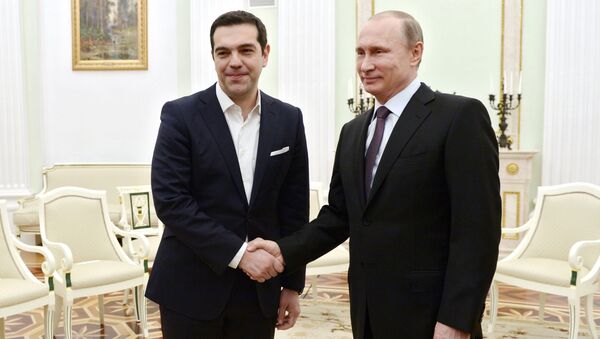The visit of Greek Prime Minister Alexis Tsipras to Moscow unnerved Brussels, ex-diplomat and political analyst Melkulangara Bhadrakumar said.
The EU may end up on the losing side if cooperation between the two countries deepens, RIA Novosti reported Bhadrakumar as saying.
In Brussels, it was believed that Alexis Tsipras went to Moscow to sign a ‘Faustian bargain’ — in exchange for financial aid without any guarantees from Moscow, Athens would split European politics. But this prediction turns out to be irrelevant if the benefits which both parties will reap are taken into consideration.
At the joint press conference with Tsipras in Moscow, Russian President Vladimir Putin flatly denied that the visiting Greek prime minister asked for any aid as such. But then, Putin also described the talks with Tsipras as “substantive, constructive and very open.”
“Indeed, you can call “aid” by some other name as well — trade and investment, for instance. On the one hand, Russia seems willing to give Greece funds based on future profits earned from allowing the transit of Russian gas via the proposed “Turkish Stream” pipeline taking Russian gas via Turkey to Greece and onward to countries of southern Europe. On the other hand, Athens would also benefit out of the reduced price at which Russia may be willing to sell gas to Greece,” the analyst said. “In other words, what we are talking about is not assistance but cooperation, including in the financial sector, in relation to specific large projects.”
Vladimir Putin has chosen the right politics, the same can be said about Alexis Tsipras, according to the analyst. One wrong move — and any help from Moscow to the Greek authorities, now under pressure from EU and Germany, would be considered by Brussels as Russia’s plan to collapse the Eurozone. Nevertheless, Russia managed to find other ways to help the Greek economy.
In turn, due to cooperation from Moscow, Athens can become a regional force capable of articulating its own policy of ‘strategic autonomy’ and pursue an independent foreign policy.
There is a strong possibility that Greece (along with Italy, Austria, Slovakia, Cyprus and Hungary) will be able to change the EU's policy towards Russia, Bhadrakumar concluded.



